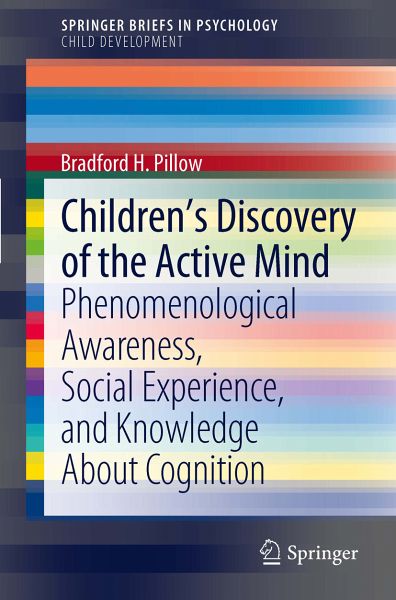
Children's Discovery of the Active Mind (eBook, PDF)
Phenomenological Awareness, Social Experience, and Knowledge About Cognition
Versandkostenfrei!
Sofort per Download lieferbar
38,95 €
inkl. MwSt.
Weitere Ausgaben:

PAYBACK Punkte
19 °P sammeln!
During the past 25 years, a great deal of research and theory has addressed the development of young children's understanding of mental states such as knowledge, beliefs, desires, intentions, and emotions. Although developments in children's understanding of the mind subsequent to early childhood has received less attention, in recent years a growing body of research has emerged examining understanding of psychological functioning during middle and late childhood. Combined with the literature on adolescent epistemological development, this research provides a broader picture of age-related cha...
During the past 25 years, a great deal of research and theory has addressed the development of young children's understanding of mental states such as knowledge, beliefs, desires, intentions, and emotions. Although developments in children's understanding of the mind subsequent to early childhood has received less attention, in recent years a growing body of research has emerged examining understanding of psychological functioning during middle and late childhood. Combined with the literature on adolescent epistemological development, this research provides a broader picture of age-related changes in children's understanding of the mind.
Guided by the goals of describing developmental changes in children's concepts of cognitive functioning and identifying sources of information that contribute to learning about cognition, Children's Discovery of the Active Mind organizes empirical literature concerning the development of children's knowledge of cognitive activities from early childhood to adolescence and presents a conceptual framework that integrates children's introspective activities with social influences on development. Bringing together theoretical and empirical work from developmental, cognitive, and social psychology, the author argues that rather than depending upon a single source of information, developmental progress is driven by combinations of children's conceptual knowledge of mental functioning, children's phenomenological awareness of their own cognitive activities, and children's social experience.
Guided by the goals of describing developmental changes in children's concepts of cognitive functioning and identifying sources of information that contribute to learning about cognition, Children's Discovery of the Active Mind organizes empirical literature concerning the development of children's knowledge of cognitive activities from early childhood to adolescence and presents a conceptual framework that integrates children's introspective activities with social influences on development. Bringing together theoretical and empirical work from developmental, cognitive, and social psychology, the author argues that rather than depending upon a single source of information, developmental progress is driven by combinations of children's conceptual knowledge of mental functioning, children's phenomenological awareness of their own cognitive activities, and children's social experience.
Dieser Download kann aus rechtlichen Gründen nur mit Rechnungsadresse in A, B, BG, CY, CZ, D, DK, EW, E, FIN, F, GR, HR, H, IRL, I, LT, L, LR, M, NL, PL, P, R, S, SLO, SK ausgeliefert werden.












